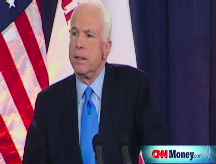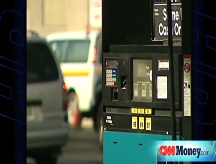Crude up on international supply fears
Oil prices recover ground on Middle East tensions, Nigerian worker strike and speculation that China's looser fuel subsidies could spur demand from refiners.
NEW YORK (CNNMoney.com) -- Concerns about supply in the Iranian, Nigerian, and Chinese oil markets sent crude through another volatile trading session Friday, with prices rising nearly $5 before settling higher by less than $3.
Traders also reacted to a weakened dollar, which fell by nearly 1% against the euro and yen Friday.
Light, sweet crude for July delivery rose $2.69 to settle at $134.62 a barrel on the New York Mercantile Exchange. Trading was also active for the August contract as the July contract expired Friday.
Tensions in the Middle East
The New York Times reported Friday that Israel carried out a "major military exercise" earlier this month that American officials say appeared to be in preparation for a potential bombing attack of Iran's nuclear facilities.
Investors worry that military conflict with Iran could disrupt shipping in the Strait of Hormuz, a major transportation corridor for oil exporters in the Persian Gulf off the coast of Iran, and further restrict supply in the global oil market.
Nigerian strike talks fall apart
In Nigeria, talks to avert a strike between a leading white-collar union and Chevron (CVX, Fortune 500) have collapsed, according to Dow Jones Newswires.
The dispute hinges on demands the union has made over safety standards, staffing and the removal of the company's head in Nigeria.
Nigerian rebels reportedly attacked a Chevron offshore oil installation Thursday and said they had captured an American worker on a supply vessel but later released him.
China raises fuel prices
The Chinese government said Thursday it would raise the price of gasoline by 16% and diesel fuel by 18%. Investors initially believed the price hikes could dampen demand from China's growing economy.
"This is going to finally mean that the Chinese are going to feel more of the pain," said Peter Beutel, oil analyst with Cameron Hanover.
However, many investors Friday believed that Chinese refiners may start purchasing more oil, since the price hike would likely increase their margins.
"If they can sell refined products for a price closer to the real price, then they can start making a real profit," said Beutel.
Pawlicki estimates that the hike will bring retail gas prices in China to $2.84 a gallon, "which is still cheap compared to market prices of around $3.40 and U.S. prices of around $4.10 a gallon."
The question may become whether Chinese consumers are willing to pay more for fuel and the answer is likely yes, Pawlicki said.
"Fuel costs are still below market rates and the growing middle class may not have a problem affording it," he added.
Other international news
Concern about high oil prices led Saudi Arabia, the world's largest producer, to call a weekend summit between oil producers and oil consumers to address the issue before high prices can permanently damage demand.
But the oil market has largely shrugged off recent statements by Saudi officials that the Kingdom will increase production by 100,000 to 200,000 barrels per day.
"Expectations for the Saudi meeting have diminished as the week goes on," said Tom Pawlicki, an oil industry analyst at MF Global.
Also pushing oil higher were comments by Chakib Khelil, president of the Organization of the Petroleum Exporting Countries.
Khelil told the Algerie Press Service on Friday it was "illogical and irrational" to ask the cartel to increase output so as to take the pressure off soaring prices.
Meanwhile, Venezuelan President Hugo Chavez criticized a European Union decision to tighten deportation standards and threatened to deny oil exports to Europe in response.
Fuel prices mixed
Retail gas prices rose slightly Friday. The national average price for a gallon of regular gas rise to $4.075 from $4.073 the day before, according to a daily survey by motorist group AAA.
Diesel prices, however, fell to a national average price of $4.786 a gallon from $4.791 the day before.
This week in oil
Friday capped off an up and down week for oil. After prices soared to a record $139.89 Monday, crude endured large, volatile swings throughout the week as traders weighed bearish supply news with international conflict.
Saudi Arabia's commitment to produce more oil as well as a push by President Bush Wednesday to permit more drilling for domestic oil were largely offset by fears about Nigerian and Iranian supply disruptions. The market sold off Thursday on China's decision to lift some of its oil subsidies, but by Friday, Traders saw the news as an opportunity to buy.
Stephen Schork, said in his energy industry newsletter The Schork Report that we should get used to more wild swings of $5 or more a day. "Given the current volatility, that's virtually normal these days," he wrote. ![]()






